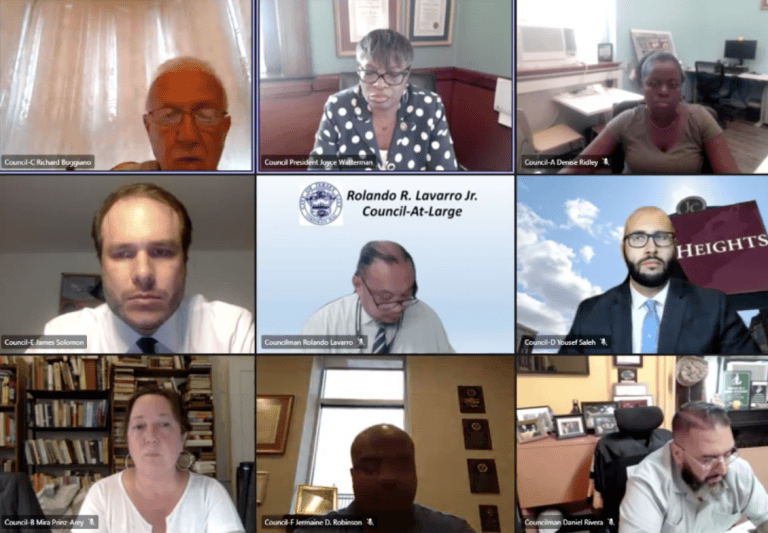
The Jersey City Council will consider a myriad of cannabis-related regulations after unanimously introducing an ordinance that discusses cannabis zoning, taxation, fees, and more.
At the same meeting, a food vendor, responsible for feeding the city’s youth in the summer, and over 200 food insecure people throughout the COVID-19 pandemic, came under fire.
Cannabis regulations
Under the introduced ordinance, all six cannabis licenses will be permitted in Jersey City, but they must adhere to certain regulations and pay a licensing fee.
The application fee for municipal support of cannabis establishments and distributors will be $2,500. Annual fees for cannabis cultivator, manufacturer, distributor, and wholesaler licenses will be $5,000. Annual fees for a cannabis retailer license will be set at $15,000, and a cannabis delivery license will be set at $2,500. An annual license fee for cannabis consumption is the most expensive, at $25,000.
The city will impose a municipal user tax of 2 percent of the receipts from each sale by a cannabis manufacturer and cannabis retailer as well as a tax of 1 percent of the receipts from each sale by a cannabis wholesaler.
Should a cannabis establishment fail to pay the tax when due, the city will impose a lien on the property for the unpaid balance and accrued interest.
The revenues from the user tax will be split evenly between the Jersey City Public School District and social equity programs, according to the ordinance.
A Cannabis Fund Committee will be established in future legislation. It will determine the allocation of the funding from this Cannabis Fund based on the needs of the community on an annual basis.
As far as where the establishments can be located, the ordinance states that cannabis cultivators, manufacturers, wholesalers, and distributors will be conditionally permitted in in all industrial zones, light industrial zones or industrial overlays as well as the Highway Commercial Zone (HC) along Tonnele Avenue. They can not be co-located with any residential building on the same lot. Those classified as a micro businesses will be conditionally permitted in the Commercial/Automotive (C/A) or Highway Commercial (HC) Zones.
Cannabis retailers will be conditionally allowed Neighborhood Commercial (NC), Palisade Avenue Mixed Use Multi-Family Attached Housing District (R-2D), Commercial/Automotive (C/A), Highway Commercial (HC), Waterfront Planned Development (WPD), Central Business District (CBD), and Office/Residential (O/R) Zones.
Consumption of cannabis will not be permitted in any public place indoors or outdoors, including sidewalks, parks, and pedestrian plazas,
The ordinance stipulates standards for each cannabis establishment such as parking requirements, odor mitigation, security regulations, hours of operation, and more.
The regulations come after New Jerseyans voted last November to legalize recreational cannabis, authorizing the growth, cultivation, processing, manufacturing, preparing, packaging, transferring, and retail purchasing and consumption of it for those over 21.
Through the New Jersey Cannabis Regulatory, Enforcement Assistance, and Marketplace Modernization Act, municipalities may adopt legislation regulating cannabis establishments, but they must enact the legislation before August 21.
If they don’t, the state default regulations will apply for the next five years.
Not fit for a cat
Council President Joyce Watterman instructed her council colleagues to make surprise visits to various summer recreation sites to inspect the children’s food as the vendor Red Rabbit LLC came under council scrutiny.
This comes after activist and Ward F council candidate Frank Gilmore posted on social media last week complaints about poor tasting and unrefrigerated food delivered by a U-Haul truck.
“Is there a continued plan for improvement because I visited the sites today myself,” said Ward D Councilman Yousef Saleh. “I tasted the food, and personally, I wouldn’t feed it to a stray cat.”
According to Rhys Powell, CEO and founder of Red Rabbit, the delivery truck had refrigeration issues which have since been addressed.
“When the food arrived, it was rejected by the site, which is proper protocol to ensure the safety of the kids,” said Powell, adding that they have since purchased four refrigerated trucks, and are visiting each of the 52 recreation sites to ensure they have coolers and ice and to get feedback on the food.
“It felt fake,” said Saleh. “The muffin tasted like Styrofoam. I probably would have rather eaten the Styrofoam.”
Feed Back
Powell said, “We have been getting lots of feedback from the sites, and a lot of them are very happy with the food that we are serving. We understand that not everyone enjoyed each meal, but that is our goal. All of our meals are cooked here in our kitchen. We are not using anything that is processed or made in a factory, and so our chefs can make adjustments very easily.”
Several council people noted that the contract on the agenda was not for the summer program but rather to feed over 200 food insecure people, noting that this program by the same company did not solicit any complaints.
But Saleh said that those who need the food might be unlikely to come forward.
“They don’t have the option to complain about it,” he said. “Why bite the hand that feeds you?”
The council voted to extend the contract to feed Jersey City’s food insecure residents until December for $410,000.
Councilmembers Saleh, James Solomon, and Rolando Lavarro voted no to the resolution’s adoption.
For updates on this and other stories follow us on Twitter @hudson_reporter. Marilyn Baer can be reached at [email protected].









